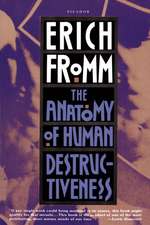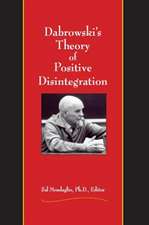Love and Hate: The Natural History of Behavior Patterns
Autor Irenaus Eibl-Eibesfeldten Limba Engleză Paperback – 31 dec 1996
| Toate formatele și edițiile | Preț | Express |
|---|---|---|
| Paperback (1) | 299.05 lei 6-8 săpt. | |
| Taylor & Francis – 31 dec 1996 | 299.05 lei 6-8 săpt. | |
| Hardback (1) | 846.42 lei 6-8 săpt. | |
| Taylor & Francis – 12 oct 2017 | 846.42 lei 6-8 săpt. |
Preț: 299.05 lei
Preț vechi: 341.55 lei
-12% Nou
Puncte Express: 449
Preț estimativ în valută:
57.25€ • 59.51$ • 47.47£
57.25€ • 59.51$ • 47.47£
Carte tipărită la comandă
Livrare economică 06-20 februarie 25
Preluare comenzi: 021 569.72.76
Specificații
ISBN-13: 9780202020389
ISBN-10: 020202038X
Pagini: 290
Dimensiuni: 152 x 229 x 17 mm
Greutate: 0.45 kg
Ediția:Aldine Pbk.
Editura: Taylor & Francis
Colecția Routledge
Locul publicării:Oxford, United Kingdom
ISBN-10: 020202038X
Pagini: 290
Dimensiuni: 152 x 229 x 17 mm
Greutate: 0.45 kg
Ediția:Aldine Pbk.
Editura: Taylor & Francis
Colecția Routledge
Locul publicării:Oxford, United Kingdom
Cuprins
Preface to the Aldine Paperback Edition, 1. The Human Beast - A Modern Caricature of Man, 2. Preprogramming in Human and Animal Behavior, 3· Phylogeny and Ritualization, 4· The Advantages of Sociability, 5· The Ethologist's View of Aggression, 6. The Biological Basis for Ethical Norms, 7 Antidotes to Aggression, 8. What Keeps People Together?, 9. More About Bond-Establishing Rites, 10. The Development of the Personal Bond and Basic Trust, 11. From Individualized Group to Anonymous Community, 12. Prospects, Bibliography, Index of Names, Index of Subjects
Descriere
The author argues that there are specific turning points in evolution. Structures and behavioral patterns that evolved in the service of discrete functions sometimes allow for unforeseen new developments as a side effect. In retrospect, they have proven to be pre-adaptations, and serve as raw material for natural selection to work upon.













